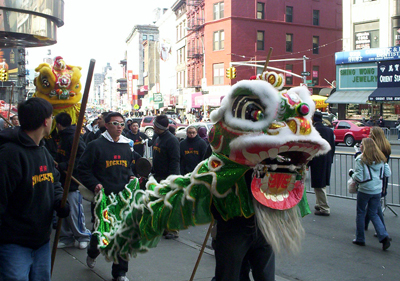
Many Asian students will be traveling home this weekend to celebrate the Lunar New Year, which this year falls on Sunday, Feb. 18. Lunar New Year is an important holiday in the Asian culture and marks the largest human migration of the year, as Chinese across the globe travel home to have reunion dinners with their families on New Year’s eve.
Although it is commonly referred to as ‘Chinese New Year,’ Lunar New Year is in fact celebrated in many other countries including North and South Korea, Vietnam, Singapore, Indonesia, Japan and Malaysia.
Many members of the Asian community are frustrated that the holiday has not been recognized by the Binghamton University administration in past years.
Joey Tsang, the Asian Student Union historian, questioned why the administration had yet to recognize the importance of the holiday to the Asian population on campus.
‘It is legitimate for the Asian community, as well as other cultural communities, to question why the most important event in Chinese culture is not acknowledged as a national holiday in America,’ he said. ‘For a country known for its cultural diversity, why isn’t the Chinese population being recognized for its traditions? It doesn’t make sense for other cultural groups to be favored over the Chinese such that their New Year’s and cultural holidays are nationally recognized.’
Last year the ASU began lobbying to get time off for the holiday, or at least to get official recognition. Despite being initially dismissed by the administration, the ASU persevered, enlisting the help of the Student Association in their quest.
Their efforts have finally paid off. While the administration has decided not to give any days off for the Lunar New Year, administration officials have been working with members of the SA and the ASU to ensure that those who celebrate the holiday will be allowed to do so without difficulty.
If BU marks it as a holiday, it would be the first university in the United States to do so.
The Student Association’s vice president for multicultural affairs, David Bass, expressed satisfaction with the University’s decision.
‘The SA certainly takes the Lunar New Year seriously, and that is why I have met the president’s deputy, Matt Johnson, to discuss the possibility of getting time off for the holiday,’ he said.
‘However, the Asian community isn’t really pushing for this anymore, and is satisfied with the University officially recognizing the holiday. This means that students would be allowed to go home and would not be penalized for missing class.’
ASU President Man Fung Wong is continuing his negotiations with the administration in hopes for the further recognition of the Lunar New Year.
‘We discussed the possibility of having recognition for Lunar New Year in the upcoming years and the possibility of adding it as a holiday to the 2010 to 2012 calendar,’ he said. ‘There is also currently a resolution being drafted by Boris Tadchiev which will allow the students to vote on this issue and show the administration that this is in fact something that all students care about.’
Bass added that the administration was ‘very receptive’ to the idea of official recognition. For the current year, Man Fung Wong plans to send out a letter to professors explaining the holiday so that they are aware that students may need to miss class to celebrate with their families.


